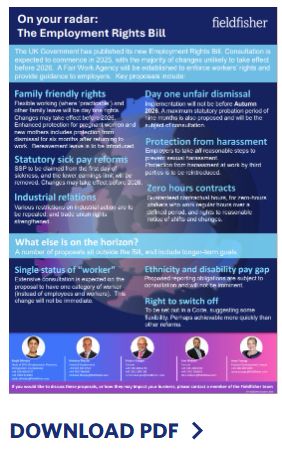- with readers working within the Construction & Engineering industries
The UK Government has published its new Employment Rights Bill. Consultation is expected to commence in 2025, with the majority of changes unlikely to take effect before 2026. A Fair Work Agency will be established to enforce workers' rights and provide guidance to employers.
Key proposals include:
Family friendly rights: Flexible working (where 'practicable') and other family leave will be day one rights. Changes may take effect before 2026. Enhanced protection for pregnant women and new mothers includes protection from dismissal for six months after returning to work. Bereavement leave is to be introduced.
Day one unfair dismissal: Implementation will not be before Autumn 2026. A maximum statutory probation period of nine months is also proposed and will be the subject of consultation.
Statutory sick pay reforms: SSP to be claimed from the first day of sickness, and the lower earnings limit will be removed. Changes may take effect before 2026.
Protection from harassment: Employers to take all reasonable steps to prevent sexual harassment. Protection from harassment at work by third parties is to be reintroduced.
Industrial relations: Various restrictions on industrial action are to be repealed, and trade union rights strengthened.
Zero hours contracts: Guaranteed contractual hours for zero-hours workers who work regular hours over a defined period, and rights to reasonable notice of shifts and changes wil be introduced.
What else is on the horizon?
A number of proposals sit outside the Bill and include longer-term goals.
Single status of "worker": Extensive consultation is expected on the proposal to have one category of worker (instead of employees and workers). This change will not be immediate.
Ethnicity and disability pay gap: Proposed reporting obligations are subject to consultation and will not be imminent.
Right to switch off: The right will be set out in a Code, rather than in statute, suggesting some flexibility. This may perhaps be achievable more quickly than other reforms.
The content of this article is intended to provide a general guide to the subject matter. Specialist advice should be sought about your specific circumstances.



